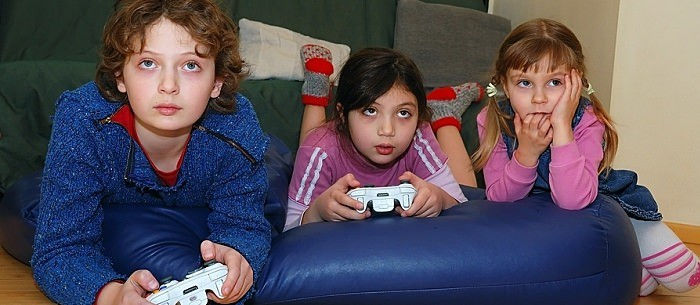More and more kids are playing video and computer games — especially violent ones, which are becoming more popular and realistic each year. As a parent, you’re probably wondering what to do. Should you hide your child away from any video games with even a hint of violence, or are the effects really not that bad?
The truth is that no one knows for sure. Experts agree that violence in video games alone won’t cause the average child to act violently. However, according to Dr. Nadja Reilly, the associate director of the Freedman Center for Child & Family Development, children who are exposed to risk factors, such as aggression and conflict at home, are the most likely to internalize the violence in games and act out. Exposure to violent video games can also lead to desensitization to violence and other factors, such as bullying, foul language, racism and homophobia, says Dr. Reilly.
However, parents don’t have to turn to an all-or-nothing approach. Maintain a happy medium that reflects your own personal values — and teach important life skills along the way — with these tips:
Tips for Parents
- Do Your Research
According to Dr. Christopher Ferguson, the head of the Psychology Department at Stetson University, who has performed extensive research on the effects of video game violence, it’s relatively easy to determine how much violence is in a video game before you buy it.Check out ESRB.org, which places an age and content rating on each and every video game sold. For more detailed information, seek out websites that provide reviews, such as CommonsenseMedia.org, to see what other parents are saying about the video game. If you still aren’t sure, rent the game from a local video store or online service and play it with your child before you commit.
- Watch Your Child’s Cues
Dr. Ferguson also notes that different kids respond to violence in video games in different ways. “Parents should watch their child closely and respond to their cues,” says Dr. Ferguson. Then you can decide what types of games work best for your family.
- Spend Time Playing Video Games With Your Child
Dr. Reilly stresses that it’s extremely important to invest time and get involved in your child’s video games. As you sit down and play the game, ask your child things like, “How does that make you feel?” Kids are more likely to engage in conversation when you’re playing the game with them, says Reilly. You can also use the opportunity to strike up a conversation about life skills, such as conflict resolution, appropriate behavior and consequences.
- Limit the Time Your Child Spends Playing Violent Games
According to Dr. Ferguson, only 1 to 3 percent of children exposed to video games develop a severe addiction. However, you don’t want your child missing out on social engagements and extracurricular activities — or slacking on homework — due to gaming. Limit your child’s video games based on your own family’s core values and beliefs, such as only allowing your child to play once he or she has finished homework or only allowing gaming on the weekends.
Recommendations by Age
- Two- to 6-Year-Old Kids Aren’t Ready for Video Game Violence
According to Dr. Reilly, kids of this age group have a hard time understanding the difference between reality and fantasy.
- Six- to 11-Year-Olds Can Handle Mild Violence
Cartoon images, slapstick and fantasy violence are acceptable, but real-life violence is too scary. “School-age kids are still not at the level of abstraction where they can separate themselves from violence,” says Reilly.
- Eleven- to 17-Year-Olds Still Aren’t Ready for Most M-Rated Games
These games feature ultra-violent behavior and sexual images that aren’t good for the developing brains of teenagers. If you do choose a milder M-rated game, be sure to get involved and find out how your child is being impacted by the images in the game, recommends Reilly.
Parents and caregivers don’t have to take an all-or-nothing approach when it comes to violence in video games. “Video games aren’t altogether bad,” says Dr. Reilly. “Just be mindful of keeping a balance.”
Think your child may be addicted to video games? Read more about video game addiction.
Rebecca Desfosse is a freelance writer specializing in parenting and family topics.





